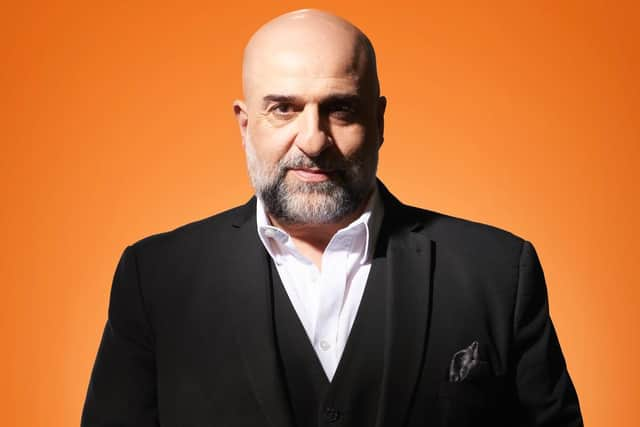Comedian Omid Djalili talks Covid and the power of laughter: "Stand-up is one of the biggest joys of my life and I thought I'd lost it"


In lockdown, he turned to novel ways of keeping his comedy sharp, but things didn't always go to plan: during one of his many Zoom gigs, Djalili was muted by 639 people. "I'd always finish Zoom shows the same way," he says, a smile on his face and a glint in his eye. "I'd take the computer into the bathroom, flush the toilet, and say 'and there's the sound of my career'.
"I honestly thought everything was over," adds Djalili, currently in the midst of The Good Times Tour. "It got to the point where I'd had enough - comics should be with people and, having now been back out on the road, I've realised just how much I've missed it. It's been a real joy and I'll never take it for granted again."
Advertisement
Hide AdAdvertisement
Hide AdSuch was Djalili's joy at being back doing the thing he loves that he found himself literally dancing with glee on the side of the stage ahead of a gig last September. "I couldn't take the excitement!" he says. "The audience spotted me and went crazy - I was blowing kisses and they were loving it. It's a little more 'make me laugh, fat boy' now, but I'm trying to carry that energy with me.


"Only you can work out how to keep that big energy going and English audiences are tough," Djalili adds. "I'll never forget seeing Chris Rock - before he became the Chris Rock he is now - die on his arse at the Comedy Store 15, 20 years ago because he was so expectant of applause. I made a mental note to never expect anything in comedy, even a laugh."
Has Covid changed how he prepared for this latest tour?
"My normal maxim has always been 'train hard, fight easy' but, with this tour, I wasn't able to train," Djalili says with a chuckle. "My whole approach of being methodical and mechanical about comedy was thrown out, so I had to be prepared to fail and get heckled and have people say 'that wasn't very good'. But living every gig on the edge has given me focus.
"Also, I'm in my 26th year of doing comedy, so partly it was 'I don't know what I'm doing', but there was also 'I know exactly what I'm doing'," Djalili continues. "I've enjoyed it more than ever. Life is so short, I don't want to do anything unless I really enjoy it and I'm loving what I'm doing now so much that I'm like a caged animal.
Advertisement
Hide AdAdvertisement
Hide Ad"Stand-up comedy is one of the biggest joys of my life and I thought I'd lost it. It's like a girlfriend or wife who you thought was going to die - you cherish them all the more."
Djalili was born in 1965 in Chelsea, London to Iranian Baháʼí parents and describes his impulse to perform as having emerged 'gradually'. Initially enraptured by a friend's ability to make adults laugh, he swiftly realised that humour was cool. After performing a sketch in class at the age of 12, his teacher asked him to perform it in front of the whole school, so he did.
"The roar from the punchline was so big, I remember feeling the stage shake," Djalili says. "I became almost like a cult hero - suddenly, the prettiest 16-year-old girls - Pinky and Perky, who wore American baseball jackets and berets - thought I was cool. I just thought 'this is good'."
Despite studying theatre at Ulster University, Djalili's 20s saw him increasingly drawn towards the comedic community rather than the more brooding thespians whom he surreptitiously viewed as comparatively dour and unfunny. As a kid for whom laughter was the key, the formula was simple: "I felt at home with comedians because we always looked for the funny.
Advertisement
Hide AdAdvertisement
Hide Ad"I remember exactly what it was about the comic community which gripped me," he adds, suddenly animated. "When you're an actor performing the finished product, people are always nervous to say what they thought if it wasn't very good - they'd say things like 'you've done it again!' to cushion matters.
"But, in comedy, trying new stuff meant other comedians would say 'that first gag was good, middle bit was sh*t', ending was iffy, but you can fix it by doing this,'" Djalili says. "I remember the theatre person in me thinking 'they're being so honest!' I love that about comics - they're the most open artists because comedy is the purest art form.
"It's a person talking and, as a result, it requires the maximum amount of human qualities like honesty."
Shooting to fame off the back of two Edinburgh Fringe performances - his solo show 'Short, Fat Kebab Shop Owner's Son' in 1995 and 'The Arab and the Jew' in 1996, which he performed alongside Jewish comedian Ivor Dembina - Djalili went on to appear in a number of box office films from Gladiator to Mamma Mia: Here We Go Again and countless hit TV shows.
Advertisement
Hide AdAdvertisement
Hide AdBut comedy remains his first love, which is how we've come to be discussing 'tanz', the rapier-like Persian concept of satire.
"Comedy requires honesty and a preparedness to offend and hurt," Djalili says. "But it also requires a thick skin to hear the truth, because the truth sets you free. Comedians speak our truth and even good jokes can offend. But let them be offended; I'm glad, because they're not looking within themselves and we're here to challenge that.
"I've always felt like an outsider and that feeling is important because, if you're a comedian, you're anti-establishment," he adds. "But what is the establishment? I was raised in Kensington with some of the most entitled people who speak to you in a certain way and maybe see you as a half-person - the little Iranian kid who was patronised a lot.
"But, when you get heckled, you can't stand there and say 'please listen to me, I'm only doing this to heal the wounds of my childhood'."
Advertisement
Hide AdAdvertisement
Hide AdNow back into the boxer's rhythm of endless tour dates and gigs the length and breadth of the country, Djalili turns to the thing which was so sorely missing during lockdown: the intoxicating magic of live performance. "Nothing beats it," he says, describing its impact as 'physiological'. "It makes you feel like you've got wings on your shoes.
"Comedy is a joyous business and I'm so proud and happy to be a part of it," Djalili adds. "I'll probably never stop doing it - I'll be the Barry Cryer of Iran and just carry on until I literally can't do it anymore because there's not a day goes by that I haven't belly-laughed and, you know something, a belly-laugh is so good for you - it's the equivalent of 20 minutes of yoga.
"It keeps your brain sharp and your heart young and, when you think of a joke, tell it, and get a laugh... there are very few joys that compare."
Omid Djalili will be at the Blackpool Grand Theatre on February 13th and Burnley Mechanics on April 22nd with The Good Times Tour.